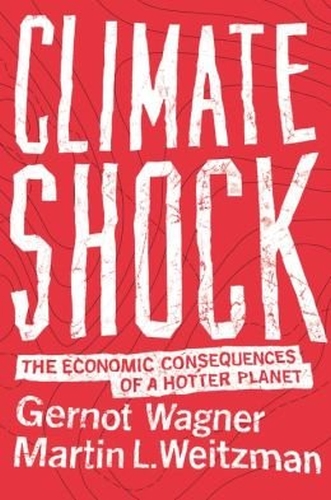

| CLIMATE SHOCK The Economic Consequences of a Hotter Planet Gernot Wagner Martin L. Weitzman Princeton: Princeton University Press, 2015 |
Rating: 4.5 High |
|||
| ISBN-13 978-0-691-15947-8 | ||||
| ISBN-10 0-691-15947-5 | 250pp. | HC/GSI | $27.95 | |
This book makes six points:
There may well be one of these breakthroughs just around the corner. Human history seemingly shows that there always is. It's why we are still here as a species. But hoping for a breakthrough is not a strategy. That's why we return to the undeniable importance of policy. That, too, has worked in the past. – Page 20 |
They mention some of those successes — notably the Montreal Protocol which led to the phaseout of chlorofluorocarbons and is restoring the ozone layer. Climate change is a tougher challenge; it calls for policies that go far beyond adding a few percent to the price of spray-can products. Not only corporate futures but individual lives will be changed.1
But as grim as that prospect might seem, the grimness of unbridled climate change greatly exceeds it. Let me come back, as the authors do, to the 10 percent risk of temperatures more than 6°C higher than pre-industrial norms. They would usher in a world most of us can barely imagine, one with which we are ill-prepared to cope. More frequent storms, heavier deluges and longer droughts are just the beginning.
Gernot Wagner is lead senior economist at the Environmental Defense Fund.
Martin L. Weitzman is professor of economics at Harvard University.
"Let's jump right to the conclusion. Take the latest consensus verdict at face value and assume a 'likely range for climate sensitivity of between 1.5 and 4.5°C (2.7 and 8°F). Equally important, stick to the IPCC definition of 'likely' and assume it means a chance of greater than 66 percent but less than 90 percent. (The latter would be 'very likely.') And take the IEA's interpretation of current government policy committments at face value. Here's what you get: about a 10 percent chance of eventual temperatures exceeding 6°C (11°F), unless the world acts much more decisively than it has." *
* * "Now we are truly in the realm of what Nassim Nicholas Taleb describes as a 'Black Swan' and Donald Rumsfeld as 'unknown unknowns.' We don't know the full implications of an eventual 6°C (11°F) temperature change. We can't know. It's a blind planetary gamble. Devastating home fires, car crashes, and other personal catastrophes are almost always much less likely than 10 percent. And still, people take out insurance to cover against these remote possibilities, or are even required to do so by laws that hope to avoid pushing these costs onto society. Risks like this on a planetary scale should not—must not—be pushed onto society." – Pages 53 & 55 |
I don't want to overstate the dangers. The planet is not at risk; humans are very unlikely to go extinct, and civilization will probably survive (though in a somewhat less expansive form.) The key thing to remember is that we can take action to avoid a great deal of the damage.
But that is a subject for other books. The writing in this one is crisp, a bit slangy in places, very easy to assimilate. The book is well organized for its task. It could be somewhat better organized, and there are places where the clarity could be improved. There are extensive endnotes, a good index, and a bibliography of 412 entries. I mark it down one notch, but it is definitely worth reading and possibly a keeper.

 To contact Chris Winter, send email to this address.
To contact Chris Winter, send email to this address.